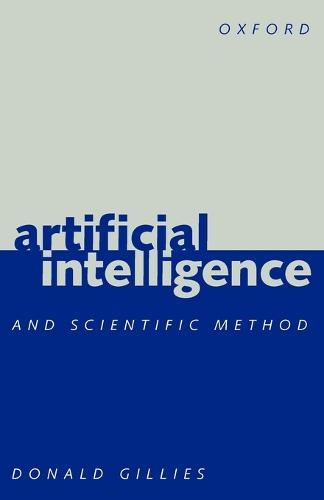Overview
Artificial Intelligence and Scientific Method examines the remarkable advances made in the field of AI over the past twenty years, discussing their profound implications for philosophy.Taking a clear, non-technical approach, Donald Gillies focuses on two key topics within AI: machine learning in the Turing tradition and the development of logic programming and its connection with non-monotonic logic. Demonstrating how current views on scientific method are challenged by this recent research, he goes on to suggest a new framework for the study of logic. Finally, Professor Gillies draws on work by such seminal thinkers as Bacon, Gödel, Popper, Penrose, and Lucas to address the hotly contested question of whether computers might become intellectually superior to human beings.
Full Product Details
Author: Donald Gillies (Professor of the Philosophy of Science and Mathematics, Professor of the Philosophy of Science and Mathematics, King's College, London)
Publisher: Oxford University Press
Imprint: Oxford University Press
Dimensions:
Width: 13.60cm
, Height: 1.10cm
, Length: 21.60cm
Weight: 0.236kg
ISBN: 9780198751595
ISBN 10: 0198751591
Pages: 192
Publication Date: 05 September 1996
Audience:
Professional and scholarly
,
Professional & Vocational
Format: Paperback
Publisher's Status: Active
Availability: To order

Stock availability from the supplier is unknown. We will order it for you and ship this item to you once it is received by us.
Reviews
An old-fashioned monograph: tightly argued, heavily referenced. New Scientist if you are not a philosopher this book is worth reading - but for interest alone ... If you know any philosophers, however, you should make sure they read it. Mike James, Scientific Computing World, June 1997 '...Donald Gillies's new book is a worthy addition to the literature...a fascinating and occasionally bold investigation of an ongoing, two-way interaction...Gillies has produced an insightful, well-written book, which will be welcomed as a useful contribution to contemporary debate by philosophers of logic, philosophers and historians of science, philosophers of AI, and AI researchers 'on the ground...' Michael Wheeler, Univ. of Oxford.
Although a machine can perform deduction based on available knowledge, the real question is whether a machine can genuinely perform induction based on observations alone. The author presents a number of practical developments in nontechnical terms to illustrate the arguments for and against the induction approach. . . A very easy-to-read book for those more inclined toward philosophical perspectives. --Choice<br> In this book Donald Gillies, a practitioner of the philosophy of science who in recent years has become interested in the field of artificial intelligence, discusses some of the implications each of these two disciplines holds for the other. . . . The work is best regarded as an extended essay, touching on a number of topics of particular interest to its author, arguing in a nondogmatic fashion for a particular point of view. Thus conceived it is quite successful. Informative, clearly written, carefully organized, and free of jargon, it could well serve as the basis for an undergraduate or graduate seminar supplemented by papers from the original journal literature. --ISIS<br>
<br> Although a machine can perform deduction based on available knowledge, the real question is whether a machine can genuinely perform induction based on observations alone. The author presents a number of practical developments in nontechnical terms to illustrate the arguments for and against the induction approach. . . A very easy-to-read book for those more inclined toward philosophical perspectives. --Choice<br> In this book Donald Gillies, a practitioner of the philosophy of science who in recent years has become interested in the field of artificial intelligence, discusses some of the implications each of these two disciplines holds for the other. . . . The work is best regarded as an extended essay, touching on a number of topics of particular interest to its author, arguing in a nondogmatic fashion for a particular point of view. Thus conceived it is quite successful. Informative, clearly written, carefully organized, and free of jargon, it could well serve as the basis for
Author Information
Donald Gillies is Professor of the Philosophy of Science and Mathematics at King's College, London. His books include An Objective Theory of Probability (1973), Revolutions in Mathematics (1992), and Philosophy of Science in the Twentieth Century (1993). He was the editor of the British Journal for the Philosophy of Science from 1982 to 1985.



